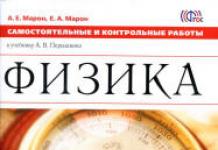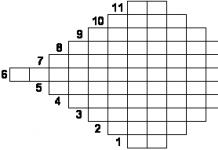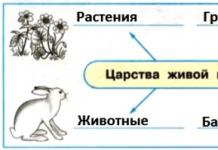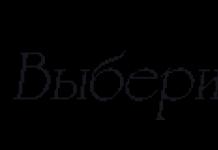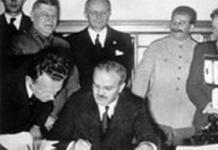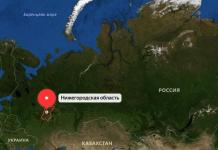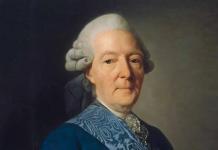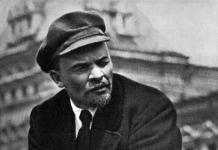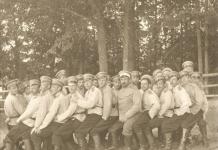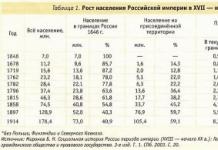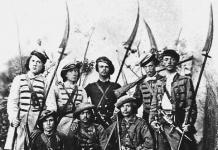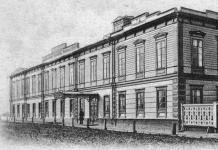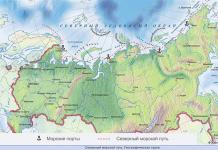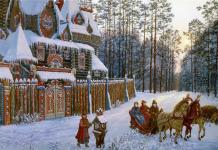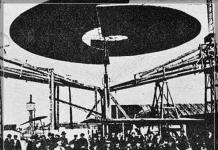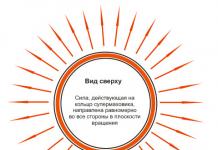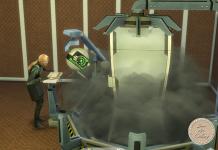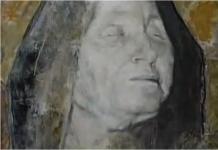Anacharsis Kloots
Anacharsis Cloots
Anacharsis Kloots (1755-1794) - one of the active participants in the French Revolution, by birth a German baron from the Duchy of Cleve, which belonged to Prussia. His real name is Jean Baptiste, he took the name of Anacharsis at the beginning of the revolution under the influence of a passion for classical antiquity. The idea of equality and brotherhood of peoples found in him a passionate follower. In 1790, on behalf of the "Committee of Foreigners", he thanked the Constituent Assembly for the struggle against tyranny. In the summer of 1791, he predicted the imminent establishment of "universal sovereignty" and the formation of "one single nation, including all mankind." Paris was to be the capital of the future world republic. In 1792, he was close to the Girondins, as a "orator of the human race" demanded that the Legislative Assembly war with Germany and donated a significant part of his fortune to the armament of France. After being elected to the Convention, he moved to the Jacobin camp. Kloots called himself a personal enemy of Christ and of every religion, proved in his literary works that only the people can be the sovereign of the world, that only fools can believe in the supreme being, whose cult was proposed by Robespierre. In the summer of 1794, after the decision was made to exclude foreigners from the Convention, he was arrested and brought to trial. In the indictment, Kloots was charged with the intention to restore the monarchy and even "open the doors of prisons and direct the released criminals against the Convention, destroy the republic by inciting civil war, slander, incitement of revolts, damage to morals, undermining social principles, suffocating the revolution with hunger ... ". When Kloots was taken to the building of the Revolutionary Tribunal, the crowd escorted him shouting: "Prussian to the guillotine!" He answered: "Let the guillotine, but admit it, citizens because it is strange that a man who would have been burned in Rome, hanged in London, wheeled in Vienna, should be guillotined in Paris, where the republic has triumphed.
Reprinted from the site
The French Revolution
http://liberte.da.ru/
Cloots, Anacharsis (real name - Jean Baptiste) (24.VI.1755 - 24.III.1794) - French political figure, participant in the French bourgeois revolution of the late 18th century, philosopher-educator and publicist. Dutch by birth, Prussian baron. Kloots promoted pantheism - a philosophical doctrine that identifies God with nature. Since the beginning of the French Revolution, he settled in Paris, becoming close to the encyclopedists. In 1792 he was elected to the Convention. An opponent of Catholicism, Kloots in 1793 advocated forcible de-Christianization. He demanded the continuation of the war with the anti-French coalition until the creation of a world union of republics. The implementation of such an adventurous cosmopolitan program by Kloots could prove detrimental to the interests of revolutionary France. Kloots' program reinstated against him M. Robespierre and many others Jacobins who sought to consolidate the gains of the revolution in France and ensure her peace and recognition of the European powers. In December 1793, Kloots was expelled from the Jacobin Club and then removed from the Convention. Tried by the Revolutionary Tribunal, Kloots was executed along with a group of left-wing Jacobins - the so-called Ebertists.
Soviet historical encyclopedia. In 16 volumes. - M.: Soviet Encyclopedia. 1973-1982. Volume 7. KARAKEEV - KOSHAKER. 1965.
Read further:
The French Revolution ( chronological table)
Literature:
Engels F., (Letter) to V. Adler dated 4 December. 1889, K. Marx and F. Engels, Soch., vol. 28, (L.), 1940;
Avenel G., Anacharsis Cloots, l "orateur du genre humain, t. 1-2, P., 1865.
Active publicist. He had the title of a Prussian baron.
| Anacharsis Kloots | |
|---|---|
| Anacharsis Cloots | |
| Name at birth | Jean Baptiste du Val-de-Grâce [Gnadenthal], Baron de Kloots |
| Date of Birth | June 24(1755-06-24 ) |
| Place of Birth | Gnadenthal Castle, near Kleve, Prussia |
| Date of death | March 24(1794-03-24 ) (38 years) |
| A place of death | Paris |
| Citizenship | France France |
| Occupation | Leader of the French Revolution |
| Autograph | |
| Anacharsis Kloots at Wikimedia Commons | |
Origins and life in the years leading up to the French Revolution
Jean Baptiste's father, Baron Thomas François Kloots, originally from a Dutch merchant family, was forced to leave the Protestant Netherlands and move to Prussia due to the persecution of the Catholics to which he belonged, where he managed to make an excellent career, having received the rank of Privy Councilor under the Prussian king. Kloots Jr. received a French upbringing from childhood (the province of Cleve at that time was poorly Germanized), and even German knew mediocre. At the age of seven, Jean Baptiste was sent to a theological school in Brussels, then to the Jesuit College in Mons, after which he studied for six years at the Plessis-Sorbonne College, from where his father transferred him to military academy in Berlin, whose barracks spirit Kloots Jr. was very weary of. After the death of his father, Kloots inherited his considerable fortune and in 1776 came to Paris, where he became close to the Encyclopedists, visited Voltaire, Rousseau, met Lafayette, Franklin, Mably, Bailly, etc.; developed pantheistic ideas associating them with an active anti-church position.
After three years During his stay in Paris, he traveled around Europe several times; from his last trip to Spain, Kloots returned already at the height of the revolution, in July 1789.
Activities during the revolution
Since 1793, Kloots advocated forcible "de-Christianization", calling himself a personal enemy of Christ and every religion, arguing in his literary works that only the people can be the master of the world, that only fools can believe in a higher being, whose cult the supporters of Robespierre tried to organize. Kloots supported the replacement of Catholicism, the crowd accompanied him with a cry: "Prussian to the guillotine!" He answered: “Let him be guillotined, but admit it, citizens, it’s strange that a person who would be burned in Rome, hanged in London, wheeled in Vienna, will be guillotined in Paris, where the republic has triumphed.” In the indictment, he was charged with the intention to restore the monarchy and even " open prison doors and direct released criminals against the Convention, destroy the republic by instigating civil war, slander, inciting rebellions, corrupting morals, undermining public principles, strangling the revolution by starvation».
Anacharsis Kloots, “Jehovah’s personal enemy,” who also died very courageously, on his last night was most upset by the fact that some of the condemned “retained faith in the immortality of the soul,” and tried in every possible way to dissuade them: there will be no immortality, tomorrow from there will be absolutely nothing left for us.
Kloots was executed along with the Hebertists on charges of espionage, but in fact for promoting the ideas of a revolutionary war and a "world union of republics", the implementation of which unambiguously led France to war with all of Europe, which Robespierre and his supporters wanted to avoid in any case. , who advocated the establishment of peaceful relations with foreign powers, so that the propaganda of Kloots was perceived by the Robespierrists as an attempt to draw France into a disastrous war for her, covered up by extremely revolutionary appeals, which seemed to them an undoubted sign of "aristocratism" (that is, counter-revolution, since at that time under "aristocrats" meant all opponents of the revolution and the republic, regardless of origin).
(1755-06-24 )From 1793, Kloots advocated forcible “de-Christianization”, calling himself a personal enemy of Christ and every religion, proving in his literary works that only the people can be the master of the world, that only fools can believe in a higher being, whose cult the supporters of Robespierre tried to organize. Kloots supported the replacement of Catholicism by the cult of Reason, believing that the people are now ready to no longer believe in "priest tricks" and turn to "true morality."
During the trial of Louis XVI, Kloots voted for the execution of the former king "in the name of mankind".
Arrest and death
In December 1793, he was expelled from the Jacobin Club, and in the spring of 1794, after a decision was made to exclude foreigners from the Convention, he was arrested and brought to trial. As Kloots was being taken to the building of the Revolutionary Tribunal, the crowd escorted him off shouting "Prussian to the guillotine!". He answered: “Let him be guillotined, but admit it, citizens, it’s strange that a person who would be burned in Rome, hanged in London, wheeled in Vienna, will be guillotined in Paris, where the republic has triumphed.” In the indictment, he was charged with the intention to restore the monarchy and even " open prison doors and direct released criminals against the Convention, destroy the republic by instigating civil war, slander, inciting rebellions, corrupting morals, undermining public principles, strangling the revolution by starvation».
Anacharsis Kloots, “Jehovah’s personal enemy,” who also died very courageously, on his last night was most upset by the fact that some of the condemned “retained faith in the immortality of the soul,” and tried in every possible way to dissuade them: there will be no immortality, tomorrow from there will be absolutely nothing left for us.
Kloots was executed along with
Origins and life in the years leading up to the French Revolution
Jean Baptiste's father, Baron Thomas François Kloots, originally from a Dutch merchant family, was forced to leave the Protestant Netherlands and move to Prussia due to the persecution of the Catholics to which he belonged, where he managed to make an excellent career, having received the rank of Privy Councilor under the Prussian king. Kloots Jr. received a French upbringing from childhood (the province of Cleve at that time was poorly Germanized), and even did not know German very well. At the age of seven, Jean Baptiste was sent to a theological school in Brussels, then to the Jesuit College in Mons, after which he studied for six years at the Plessis-Sorbonne College, from where his father transferred him to the Military Academy in Berlin, the barracks spirit of which Kloots Jr. was very burdened. After the death of his father, having inherited his large fortune, Kloots came to Paris in 1776, where he became close to the Encyclopedists, visited Voltaire, Rousseau, met Lafayette, Franklin, Mably, Bagli, etc.; developed pantheistic ideas associating them with an active anti-church position. After three years in Paris, he traveled several times in Europe, from his last trip to Spain, Kloots returned already at the height of the revolution, in July 1789.
Activities during the revolution
From 1789 Kloots was a member of the Jacobin Club. During the years of the revolution, he took French citizenship, was elected to the Convention (1792) from the department of Ouaz. In 1790, he spoke three times at the Jacobin Club on various issues. During the first three years of the Revolution, Kloots published most often in the Chronique de Paris. In addition, he published in Monitere, in Brissot's General Gazette, in Camille Desmoulins' magazine (Revolution de France et de Brabant), in the Patriotic Annals. Then Kloots issued a number of small brochures on topical issues (in 1790 - 4, in 1791 - 2, in 1792 - 12, in 1793 -9). In all these pamphlets, the author's rapidly increasing radicalization from deism to atheism and from liberal monarchism to extreme left-wing views at that time is noticeable. Kloots considered the creation of a "world republic" to be the main goal of the revolution. In 1790, he led a delegation to the National Assembly from representatives of various peoples who had joined the revolution. As head of the delegation, he declared that the French Revolution was only the beginning of a world revolution, which became the main "propaganda" theme in his articles, speeches and speeches. To implement this plan, the “orator of the human race” (as Kloots often called himself) demanded (from December 1791) a declaration of war on the European powers, and after it began, the continuation of the war until the creation of a “world union of republics”, the capital of which was, according to him, view, become Paris. In 1792 he donated 12,000 francs for the general armament of France. Such adventurism and cosmopolitanism was received with extremely negative hostility by M. Robespierre and other Jacobins. Since 1793, Kloots advocated forcible "de-Christianization", calling himself a personal enemy of Christ and every religion, arguing in his literary works that only the people can be the master of the world, that only fools can believe in a higher being, whose cult the supporters of Robespierre tried to organize. Kloots supported the replacement of Catholicism by the cult of Reason, believing that the people are now ready to no longer believe in "priest tricks" and turn to "true morality."
During the trial of Louis XVI, Kloots voted for the execution of the former king "in the name of mankind".
In December 1793, he was expelled from the Jacobin Club, and in the spring of 1794, after a decision was made to exclude foreigners from the Convention, he was arrested and brought to trial. When Kloots was being taken to the building of the Revolutionary Tribunal, the crowd escorted him off shouting: "Prussian to the guillotine!" He answered: “Let him be guillotined, but admit it, citizens, it’s strange that a person who would be burned in Rome, hanged in London, wheeled in Vienna, will be guillotined in Paris, where the republic has triumphed.”
In the indictment, he was charged with the intention to restore the monarchy and even "to open the doors of prisons and send released criminals against the Convention, to destroy the republic by inciting civil war, slander, inciting rebellions, corrupting morals, undermining public principles, strangling the revolution with hunger."
Kloots was executed along with the Hebertists on charges of espionage, but in fact for promoting the ideas of a revolutionary war and a "world union of republics", the implementation of which unambiguously led France to war with all of Europe, which Robespierre and his supporters wanted to avoid in any case. , advocating the establishment of peaceful relations with foreign powers, so that the propaganda of Kloots was perceived by the Robespierrists as an attempt to drag France into a disastrous war for her, covered up by extremely revolutionary appeals, which seemed to them an undoubted sign of “aristocratism” (that is, counter-revolution, since at that time "aristocrats" meant all opponents of the revolution and the republic, regardless of origin).
The largest literary and journalistic works of Kloots
Signature of Anacharsis Kloots
- "Certitudes des preuves du Mohammedanisme" (London, 1780)
- "L'orateur du genre humain ou dépèches du prussien Cloots au prussien Herzberg" (1791)
- "Base constitutionelle de la république du genre humain" (1793)
Literature and references
- Vinogradskaya P. report "Anacharsis Kloots" in the "Bulletin of the Communist Academy" of 1929 (book 33) S.200-225
- When writing the article, material from the Great Soviet and Soviet Historical Encyclopedias was used.
- Kloots A. Constitutional foundations of the republic of the human race
Categories:
- Personalities in alphabetical order
- June 24
- Born in 1755
- Deceased March 24
- Deceased in 1794
- Deceased in Paris
- People of the French Revolution in alphabetical order
- Executed revolutionaries
- Figures of the French Revolution, executed on the guillotine
- Members of the National Convention
- Essayists of France
- Barons
- Religious writers
Wikimedia Foundation. 2010 .
Historical reference book of a Russian MarxistKloots\ Anacharsis- (1755 1794), leader of the French Revolution, philosopher and publicist, a native of Germany; in the Convention he joined the left wing of the Jacobins; put forward an essentially adventurist plan to continue the war until the complete victory of republican principles in Europe. ... ... Biographical Dictionary of France
Kloots, Anacharsis (1755-1794), one of the active participants in the French Revolution, was a German by birth and came from the Duchy of Cleve, which belonged to Prussia. His real name was Jean Baptiste; he took the name of Anacharsis at the beginning of the revolution ... ... 1000 biographies
- (Anacharsis, actually Jean Baptist du Val de Grâce, Baron de Cloots, 1755 1794) French revolutionary figure of Prussian origin; brought up in Paris. Imbued with enthusiasm for ancient Greek democracy, K. took the name ... ... encyclopedic Dictionary F. Brockhaus and I.A. Efron
- (Cloots) Anacharsis (real name Jean Baptiste) (6/24/1755, Gnadental castle, near Cleve, 3/24/1794, Paris), figure of the period of the Great French Revolution; philosopher, educator, publicist. Prussian baron. In 1776 he came to Paris, became close to ... Big soviet encyclopedia
- (Cloots), Anacharsis (real name Jean Baptiste) (24.VI.1755 24.III.1794) French. political activist, member of the French bourgeois revolution con. 18th century, philosopher, educator and publicist. Dutch by origin, Prussian. baron. K. led the propaganda of pantheism philosophy ...
- (from the Greek a negative prefix and teos god) a system of views that denies any religion and its fundamentals. ideas: the existence of God, the immortality of the soul, the other world, as well as other ideas generated by belief in the supernatural. A. relies on ... ... Soviet historical encyclopedia
Years 1790 1791 1792 1793 1794 1795 1796 1797 1798 Decades 1770s 1780s 1790s 1800s 1810s ... Wikipedia
32 0
(1755 - 1794) - one of the active participants in the French Revolution, was a German by birth and came from the Duchy of Cleve, which belonged to Prussia. His real name was Jean Baptiste; he adopted the name of Anacharsis at the beginning of the revolution under the influence of a passion for classical antiquity. The idea of equality and brotherhood of peoples found in him a passionate follower. In 1790, on behalf of the "Committee of Foreigners", he thanked the Constituent Assembly for the fight against tyranny. As "orator of the human race," he demanded war with Germany from the Legislative Assembly and donated a significant part of his fortune to the armament of France. In 1792 he was elected to the Convention. He called himself a personal enemy of Christ and of every religion and proved in his literary works that only the people can be the sovereign of the world and that only fools can believe in the supreme being, whose cult was established by Robespierre. At the request of the latter, he was brought to trial in the case of the left faction of the Jacobins and executed in 1794 /T. twenty/
Meanings in other dictionaries
Kloots Anacharsis
Cloots Anacharsis (real name Jean Baptiste) (June 24, 1755, Gnadental Castle, near Cleve, ‒ March 24, 1794, Paris), figure during the French Revolution; philosopher, educator, publicist. Prussian baron. In 1776 he came to Paris, became close to the encyclopedists; developed the ideas of pantheism Since 1789, a member of the Jacobin Club. During the years of the revolution, he took French citizenship and was elected to the Convention (1792). G...
Klondike
The gold-bearing region in the North-West of Canada in the basin of the river of the same name, was discovered in 1896. It caused a "gold rush" at the beginning of the 20th century. In a figurative sense - a rich place, abundance. ...
Clontarf Norman Invasion of Ireland
Location of the battle 23 Apr. 1014, when the Scandinavian invaders were defeated near Dublin by the Irish of Munster, Connaught, Ulster and Meath under the command of High King Brian Boroime. The Scandinavians lost 6,000 men, but Brian and his son fell in battle. see Mortluck. ...
Kloots, Anacharsis
(1755 - 1794) - one of the active participants in the French Revolution, was a German by birth and came from the Duchy of Cleve, which belonged to Prussia. His real name was Jean Baptiste; he adopted the name of Anacharsis at the beginning of the revolution under the influence of a passion for classical antiquity. The idea of equality and brotherhood of peoples found in him a passionate follower. In 1790, on behalf of the "Committee of Foreigners", he...




